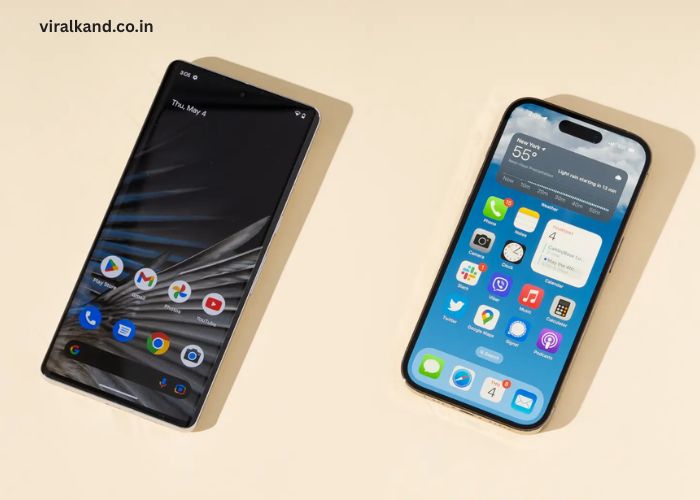When it comes to mobile operating systems, there are two main camps: Android and iOS. While both ecosystems have their strengths, one thing has always set Android apart — freedom. From customization to file management and even app installation, Android users enjoy a level of control that Apple users can only dream about.
If you’ve ever tried switching from Android to iPhone, chances are you’ve felt the walls closing in. The Apple ecosystem is polished, sure, but it’s also locked down. On Android, the doors are wide open. Want to change your launcher, sideload an app, or use a third-party slideshow maker to create a video montage from your gallery? Android won’t just allow it — it encourages it.
Let’s dive into why Android continues to be the go-to choice for users who value flexibility and control.
Total Home Screen Customization
One of the most noticeable differences between Android and iOS is how much you can customize your home screen. On Android, your phone is your canvas.
- Custom Launchers: Want to change your app drawer layout, icon style, or even how your notifications look? Launchers like Nova Launcher, Smart Launcher, and Niagara Launcher let you do just that.
- Widgets Galore: Android was years ahead of Apple when it came to widgets. And even now, Android still offers more versatile and interactive widgets.
- Live Wallpapers and Icon Packs: With apps like Zedge or Walli, and support for third-party icon packs, your phone can look entirely unique.
By contrast, Apple only recently started allowing minimal layout adjustments. On Android, you’ve been the architect all along.
Open App Ecosystem and Sideloading
Perhaps the single biggest argument for Android’s freedom is its open app ecosystem.
What Is Sideloading?
Sideloading means you can install apps from outside the Google Play Store — something iPhones don’t allow unless you jailbreak them (which voids your warranty and weakens your security). Android makes sideloading easy and relatively safe when you know what you’re doing.
This is especially useful if:
- You want to use apps not available in your country
- You’re testing your own app builds
- You prefer open-source or indie apps available on platforms like F-Droid
The Google Play Store might be the default, but it’s not the only game in town. The freedom to choose where your apps come from is a big win for power users and developers alike.
Expandable Storage and File System Access
Modern smartphones double as mini computers, and Android treats them that way.
- Expandable Storage: Many Android phones, especially from brands like Samsung or Sony, offer microSD card support. Need more space? Just pop in a card.
- File Browsing: Android users get full access to their internal storage. Whether you’re moving files to and from your PC or organizing photos in folders, Android behaves like a proper operating system.
iOS, on the other hand, hides most of its file system from users. For advanced users, that’s more limitation than protection.
Default Apps and Deeper Integrations
Ever tried setting Chrome as your default browser on iPhone? It’s possible now — barely — but it still feels like a workaround. Android lets you choose:
- Your default browser
- Messaging apps (SMS and IM)
- Email client
- Digital assistant
- Phone and dialer apps
This means you can truly personalize how your phone works on a functional level, not just how it looks.
Greater Device Variety
The Android operating system isn’t tied to one company’s hardware. Instead, it powers devices from dozens of manufacturers:
- Google Pixel for a clean, fast experience with guaranteed updates
- Samsung Galaxy for powerhouse flagships and foldables
- OnePlus for speed-focused design
- Fairphone for ethical, sustainable production
- Budget-friendly brands like Motorola or Xiaomi
This means Android caters to all budgets, design preferences, and feature needs. You’re not forced into one model per year — you’ve got options.
Developer-Friendly Environment
Android isn’t just a great experience for users — developers love it too.
- Open-source nature: Android is built on the Linux kernel and is open-source. This allows for custom ROMs (like LineageOS) and deeper modification.
- Better emulator and IDE integration: Android Studio is robust and widely supported.
- Beta testing freedom: Developers can distribute APKs directly, getting feedback without having to wait for App Store approval.
For hobbyists, tinkerers, and professional devs alike, Android is fertile ground.
Privacy on Your Terms
Contrary to popular belief, Android isn’t a privacy desert. In fact, many privacy-first alternatives have made Android their home:
- GrapheneOS, CalyxOS, and LineageOS are custom Android builds focused on security and data protection.
- DuckDuckGo, Brave Browser, and apps from F-Droid give users more control over tracking and permissions.
While iOS has made recent strides in privacy, Android’s flexibility means you can tailor your experience exactly how you like it — whether you want Google involved or not.
Actionable Tips for Android Users to Maximize Freedom
If you’re already on Android, here are a few ways to unlock even more potential:
- Try a new launcher: Check out Nova or Smart Launcher for a new home screen experience.
- Explore F-Droid: Discover open-source apps you won’t find on the Play Store.
- Use a file manager: Solid Explorer or Files by Google can help you manage internal and external storage.
- Customize default apps: Head to Settings > Apps > Default apps to set your favorites.
- Enable Developer Options: Go to Settings > About Phone and tap the Build Number seven times. Now you can access debugging tools and more.
Final Thoughts
Android’s open nature is its biggest strength. It empowers users to personalize, customize, and control nearly every aspect of their mobile experience. While iOS continues to play catch-up in some areas, Android remains the platform for those who value freedom, flexibility, and full-featured functionality.
So if you’re someone who likes tinkering, optimizing, or just wants your phone to work your way, there’s no better choice than Android. The power is literally in your hands.




